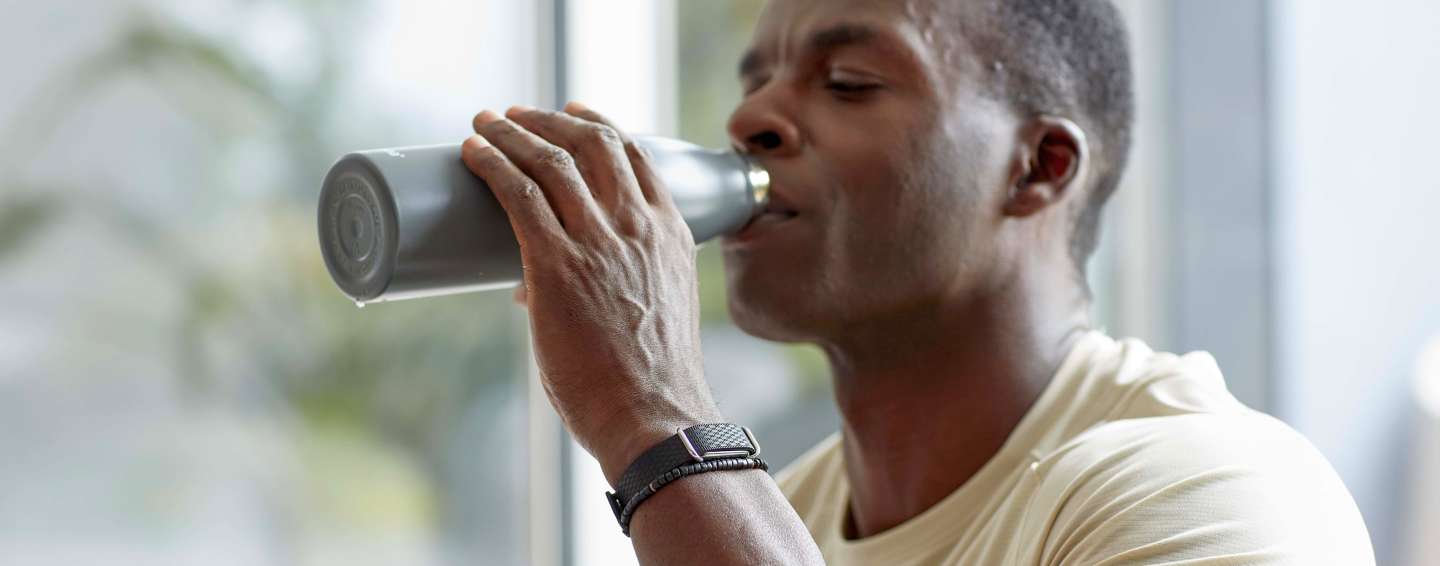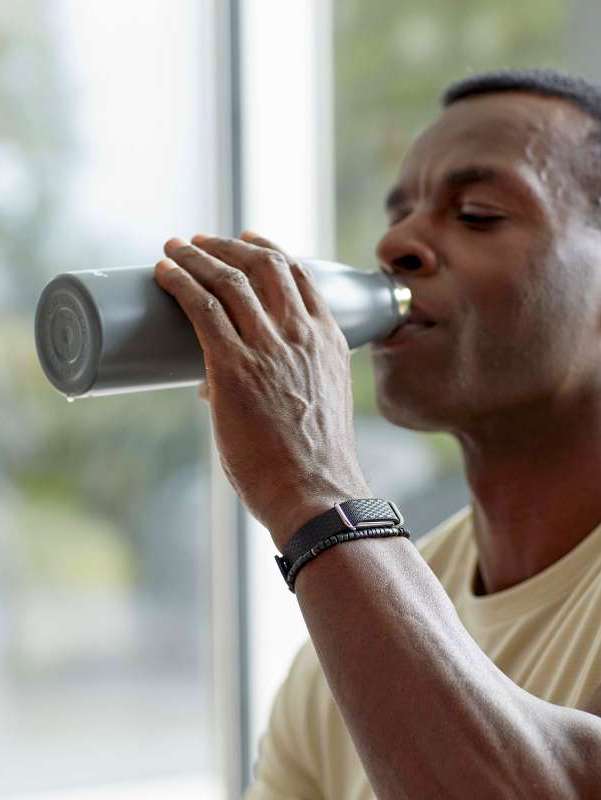Staying hydrated has a critical effect on regulating blood pressure. It’s common for people to not drink enough water, while it’s also possible to drink too much – both can throw blood pressure levels out of balance.
Keeping blood pressure at a healthy level maintains the health of your organs, like your heart and your kidneys, so it’s important to understand the relationship between hydration and blood pressure.
Not drinking enough & the effects of dehydration
Dehydration is very common, as around 70% of Canadians don’t drink enough water. In the long run dehydration leads to higher blood pressure, albeit initially blood pressure levels can drop.
Being dehydrated causes your body to release hormones such as vasopressin (antidiuretic hormone) in the brain, which cause blood vessels to constrict, conserving water by reducing your need to urinate. This can lead to higher blood pressure, as the body needs to work harder to maintain blood flow to your organs. Similarly dehydration can cause the kidneys to release renin, which results in more sodium and water retention – keeping blood pressure high.
If you drink large amounts of water while your blood vessels are constricted your blood pressure may temporarily increase even further, so it makes sense to gradually increase water intake after being dehydrated for a prolonged period.
Maintaining hydration becomes more important as you get older, at which point dehydration is increasingly associated with low blood pressure.
Ways drinking water may raise blood pressure
While it might seem counterintuitive, there are instances where water consumption can temporarily elevate blood pressure, putting you at risk of hypertension. This typically occurs if a person is significantly dehydrated before they drink a large amount of water in a short time. In that situation the volume of blood increases, leading to a temporary and physiologic rise in blood pressure due to the added volume in the circulatory system. This effect is generally short-lived, as the body’s regulatory mechanisms quickly work to restore balance.
Having too much water is sometimes known as fluid overload, which – in addition to raising your blood pressure – can make it hard to breathe.
Ways drinking water could lower blood pressure
Generally drinking plenty of water is healthy for the body’s long-term pressure levels.
Drinking water:
- Improves kidney function: The kidneys play a pivotal role in regulating blood pressure by controlling fluid balance and filtering out excess sodium and waste from the blood. Adequate water intake supports kidney function, enabling these organs to efficiently remove waste and excess sodium, which can lower blood pressure. If your blood pressure gets too high it can cause chronic kidney disease, which in turn leads to higher blood pressure – creating both a cause and an effect.
- Enhanced blood vessel function: Proper hydration ensures that blood retains an appropriate viscosity, or thickness – which should be roughly five times as thick as water. When dehydrated, blood can become thicker, making it harder for the heart to pump, and potentially increasing blood pressure. By maintaining good hydration levels, blood viscosity is kept in check, facilitating smoother blood flow and reducing strain on the cardiovascular system.
- Electrolyte balance: Drinking enough water may help your body maintain the electrolyte balance that is required for a healthy blood pressure. Water contains contributory minerals like sodium, potassium, calcium, and magnesium. You can also purchase electrolyte-boosting water, though that’s unlikely to be necessary for most people.
- Support for the autonomic nervous system: The autonomic nervous system, which controls involuntary functions like heartbeat and blood vessel constriction, is sensitive to changes in hydration.
- Mental health: A study found that drinking water reduces tension and depression, which helps maintain healthy blood pressure levels. That’s because there’s a connection between having poor mental health and high blood pressure, as another study concluded that hypertension was three times more common in depressed people.
Instantly access expert insights and tips for accurate blood pressure monitoring. Sign up for our newsletter today!
Will my blood pressure go down if I drink more water?
The relationship between water intake and blood pressure isn’t straightforward, as individual factors such as diet, lifestyle, and underlying health conditions play significant roles.
However, for many, increasing water intake, especially if previously consuming less than optimal amounts, can contribute to healthier blood pressure levels over time. It’s part of a holistic approach to cardiovascular health that includes a balanced diet, regular exercise, and stress management.
How much water should you drink to lower blood pressure?
Around six to eight glasses of water daily are recommended to maintain appropriate blood pressure levels. You can up this amount if you’re working in hot or humid conditions, or if you’re especially physically active. The right amount is also influenced by age, weight and climate.
Generally you can listen to your body’s cues to drink the right amount, responding when thirsty. Your urine also provides telltale signs on whether you’re sufficiently hydrated, as you’re aiming for it to be a light yellow colour.
The Government of Canada recommends drinking water when you’re thirsty, avoiding soft drinks and limiting caffeinated drinks to three a day, to maintain hydration.
Sodium & Drinking Water
Too much salt can raise blood pressure, so in Canada the authorities attempt to minimize the sodium levels in drinking water. The Canadian government is required to be notified when sodium levels in public drinking water exceed 20 milligrams per liter (20 mg/L).
Generally the sodium in water is only relevant to those who already have severe high blood pressure, or who require a sodium-restricted diet.
Conclusion
Water is not a cure-all for high blood pressure, though maintaining adequate hydration is a key component of a healthy lifestyle that can support long-term blood pressure regulation. It’s wise to consult a healthcare provider before making changes to diet or lifestyle, particularly for those with existing health conditions or concerns about blood pressure.
Disclaimer: If you are concerned about your blood pressure, it is best to speak to your doctor. They can advise on the best way to manage your blood pressure and whether drinking water may be beneficial.
Sources:
Victoria Lifeline, Why You Should Drink More Water This Year, January 28, 2024 – https://www.victorialifeline.ca/blog-make-2023-the-year-you-drink-more-water
Westside Med, Can Dehydration Cause High Blood Pressure? And Other Dehydration FAQs, https://www.westsidemedatl.com/blog-can-dehydration-cause-high-blood-pressure-and-other-dehydration-faqs
MedicineNet, Can Drinking Water Lower Your Blood Pressure? – https://www.medicinenet.com/can-drinking-water-lower-your-blood-pressure-article
Dehydration in the Elderly: Signs and Symptoms, Apr 7, 2023, https://www.news-medical.net/health-Dehydration-in-the-Elderly-Signs-and-Symptoms
WebMD, Overhydration: How Much Water Is Too Much?, June 21, 2024, https://www.webmd.com/diet/what-is-too-much-water-intake
My Health Alberta, Learning About Fluid Overload, June 24, 2023, https://myhealth.alberta.ca/health-aftercareinformation-pages-conditions-hwidabr3149
My Health Alberta, How the Kidneys Work, November 15, 2023
https://myhealth.alberta.ca/health-pages-conditions-hwidtp13026
My Health Alberta, Kidney Disease and High Blood Pressure: Care Instructions, 24 May 2024, https://myhealth.alberta.ca/health-aftercareinformation-pages-conditions-hwiduf9263
The Power of Water With Electrolytes: Why Your Body Needs Them, March 19, 2024, https://quenchwater.com/blog/what-is-electrolyte-water-and-what-are-the-benefits
US Department of Labor, Occupational Safety and Health Administration, The Cognitive Effects of Proper Hydration [PDF] – https://www.osha.gov/sites-BeatTheHeatWinners-Contest-Innovative-KentPrecision-CognitiveEffectsHydration
National Library of Medicine, Depression increases the risk for uncontrolled hypertension, 2013 – https://pmc.ncbi.nlm.nih.gov/articles/PMC3716493
Government of Canada, Health Promotion – Facts on fluids: How to stay hydrated, August 12, 2021 – https://www.canada.ca/department-national-defence-corporate-news-western-sentinel-facts-on-fluids-how-to-stay-hydrated
Region of Waterloo, Sodium in drinking water [PDF]. – https://www.regionofwaterloo.ca/health-and-wellness-resources-documents-SodiumDrinkingWater


